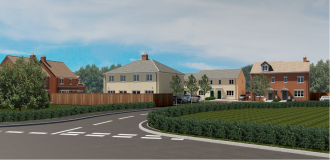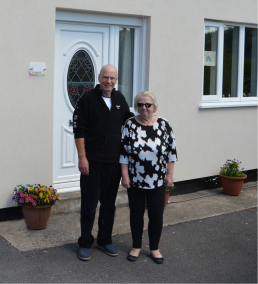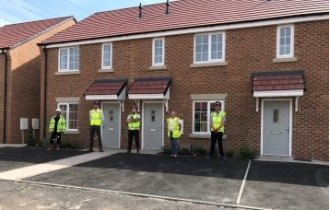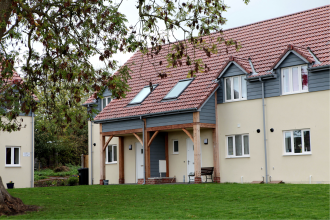T: 01822 851370 E: [email protected]
Visit RSN Survey about life in rural England to find out more.
Spotlight on Rural Housing - October 2020

A quarterly bulletin facilitated by your membership of the Rural Services Network and produced in partnership with the Rural Housing Alliance, highlighting a selection of current rural housing issues and opportunities
Planning White Paper – deadline for comments looms
‘Planning for the future,’ the government’s white paper on proposed reforms to the planning system in England, closes to consultation on 29 October 2020.
Like many organisations, RSN is currently compiling its response to the White paper and is holding a seminar to discuss this with members on 20 October.
Organisations with an interest in rural housing are urged to respond to the White Paper in time for the deadline.
You can access full details about the White Paper via this link.
Thousands of affordable homes could be lost under planning reforms
Communities could have missed out on nearly 30,000 affordable homes in the past five years if proposed government planning reforms were in place, new analysis by the Local Government Association (LGA) suggests.
As part of its wide-ranging proposals for the planning system, the Government is considering removing the requirement for developers to build affordable housing on small sites. It has consulted on whether to apply this to sites where the number of homes is under either 40 or 50.
Analysis by Glenigan, commissioned by the LGA, shows that between 2015/16 and 2019/20, there were 119,505 private homes built on sites of 10 to 49 units. Based on an average of developers being required to make 25 per cent of new housing affordable, this would have included 29,876 affordable homes being built for either rent or purchase. These homes would not have had to be included in developments under these plans. You can read more about the LGA research via this link.
Many organisations expressed significant concern over the proposed changes including the Rural Housing Alliance and RSN. You can read a copy of the RSN response here.
New cross-subsidy homes under construction in Somerset village
 A development of 15 homes, comprising 6 open market homes to cross subsidise 7 affordable rent and 2 shared ownership homes, is under construction by Willow Tree Housing Partnership in the Somerset village of Brent Knoll to the north of Bridgwater.
A development of 15 homes, comprising 6 open market homes to cross subsidise 7 affordable rent and 2 shared ownership homes, is under construction by Willow Tree Housing Partnership in the Somerset village of Brent Knoll to the north of Bridgwater.
Willow Tree Housing Partnership is committed to ensuring those working in traditional low-income areas can access homes that would otherwise be beyond their means. Like many villages in Somerset, house prices compared to average income ratios in the area are out of reach of many local workers or people disadvantaged due to age or ill health.
The land was brought to the Housing Association by EG Carter, who worked with Willow Tree Housing Partnership (then South Western Housing Society), with the support of Sedgemoor District Council and Brent Knoll Parish Council to secure the planning permission for the scheme. As is so often the case when building homes in rural areas, the site did not come without its complexities, largely the water voles, for which extensive mitigation works were undertaken to ensure a safe move to their new home.
Work commenced on site in early March 2020 but this was short-lived due to the coronavirus pandemic closing the site at the end of March until May 2020. The initial anticipated completion date of January/February 2021 has now been delayed until March/April 2021. EG Carter are working hard to build these new homes to a high standard that will benefit the future occupiers. Piling works have been completed and covid-compliant marketing events are currently being arranged to promote the homes.
Tenure and size of properties reflect the findings of a local housing need assessment and various public meetings within the community
The scheme attracted Homes England funding for the two shared ownership properties of £28,000 per home in view of their additionality to the requirements of the section 106 agreement. Sedgemoor District Council kindly funded £140,000 to support the viability of the scheme, which included £80,000 from their allocation of the Community Housing Fund.
Carbon-friendly scheme due to start at Nassington in Northamptonshire
Northamptonshire Rural Housing Association (NRHA) and partners are working hard towards achieving a start on site this autumn on the 3rd phase of development at Fenn Close in Nassington.
The scheme will include a variety of homes to suit the needs of the community including maisonettes and houses.
The development will provide six homes for social rent and three homes for shared ownership sale. There will be a further three homes for market sale available from the developer, all identified from the housing needs survey completed back in 2014.
The development will incorporate the latest in air source heating technology, enabling cost-effective heating, whilst reducing carbon dioxide emissions compared to similar gas heated homes.
The affordable homes in the scheme, which are due to be completed by early 2022, will be prioritised to local people demonstrating a local connection to Nassington.
NRHA is very grateful to the local Fenn family for providing further low-cost land to enable this development and to development agent partner Orbit, who will be committing over £400,000 of Homes England funding.
NRHA’s Development Services Manager, Neil Gilliver said “We’re pleased this development is due to start on site soon. These new homes will make a big difference to local people who are being forced to move away from the villages they know and love.”
Housing Insights from RSN
RSN Member Insights is the place to discover the statistics that define communities within membership of the Rural Services Network (RSN). It is regularly updated with new analyses, and these will be highlighted in the 'What's New' section of the RSN's Weekly Rural Bulletin. The Rural Bulletin also provides a selection of the most rurally topical news items, so do subscribe and encourage your colleagues to subscribe to what is an invaluable weekly periodical.
Updated Housing Insights analyses in September look at domestic energy efficiency ratings lodged on the energy performance of buildings register. These and other housing related analyses can be accessed via this link.
To make a suggestion of data that would benefit you by being included in the Member Insights section, please email Dan Worth, RSN’s Research and Performance Analyst, at [email protected]
Energy boost for homes across Derbyshire Dales
 Green energy funding announced on 1 October by central government will mean a near £1-million boost for non-traditional homes, almshouses and social housing across the Derbyshire Dales.
Green energy funding announced on 1 October by central government will mean a near £1-million boost for non-traditional homes, almshouses and social housing across the Derbyshire Dales.
A £760,950 grant from the Department for Business, Energy & Industrial Strategy (BEIS) will be bolstered by more than £200,000 partner contributions from Platform Housing Group and Derbyshire Dales District Council.
This will mean an energy revamp for 49 non-traditional homes in Matlock, Tansley, Darley Dale, Hognaston and Ashbourne, five amshouses in Matlock and 50 homes owned by social housing provider Platform spread across the district.
The project safeguards 87 jobs and creates six new jobs and nine apprenticeships, reducing carbon emissions across all tenures by approximately 5,383 lifetime carbon tonnes.
District Council Leader Councillor Garry Purdy said: "This is excellent news and I want to congratulate our Housing Team for winning an important grant that will help to tackle fuel poverty in 104 low income households. The project also supports estate regeneration in our market towns and includes investment for an off-gas village."
The District Council's Head of Housing Rob Cogings said: "Our programme will deliver 271 measures across 104 properties, which is great news. Thermal insulation will bring properties up to the standard of new homes built today, reducing energy costs by 40% to 50% and reducing CO2 emissions by 30 tonnes per property over 20 years."
£100,000 funding from Derbyshire Dales District Council has already transformed non-traditional homes at Matlock's Hurst Farm, where re-cladding work on 11 of the privately-owned 1950s' properties is dramatically improving their energy efficiency.
For more information please contact Derbyshire Dales District Council.
Strong demand for affordable village homes
 High levels of interest in newly built homes released during Rural Housing Week have underlined strong demand for affordable housing in a Staffordshire village.
High levels of interest in newly built homes released during Rural Housing Week have underlined strong demand for affordable housing in a Staffordshire village.
Leading affordable homes provider Housing Plus Group marked the national annual celebration of rural housing by showcasing 26 new homes on a development in the village of Coven. Thirteen of the homes in Saredon Gardens will be available for shared ownership and the remainder will be for social rent.
"It is some years since affordable housing has been built in Coven and the level of enquiries for shared ownership that we have already received demonstrates how difficult it is for people to purchase a home outright in these village communities," said Housing Plus Group development director Kerry Bolister.
"In Rural Housing Week we're not only focussing on the demand for this kind of property but also highlighting the vital role that affordable housing plays in sustaining thriving villages. Incoming families support village schools and new residents help to maintain the local facilities and shops that create such a strong sense of community."
Like many villages, Coven has experienced rising property prices which place home ownership beyond the reach of many prospective buyers. South Staffordshire District Council identified the site in its local development plan and local councillors visited the site to officially ‘break ground' when Lovell Homes began building the mixed community of open market, shared ownership and homes to rent.
Shared ownership opportunities for two and three-bedroomed homes in Saredon Gardens start at just 25% of the property value, making it possible for more buyers to get onto the first rung of the property ladder. Purchasers can ‘staircase' or increase the share of the house that they own as their circumstances change. Importantly, the shared owners can never buy more than 80% of the value of their property, meaning that the homes will provide a long-lasting shared ownership resource in the village.
Housing Plus Group members include Stafford and Rural Homes, South Staffordshire Housing Association, Severnside Housing and Severn Homes. The Group has invested £20m in rural housing schemes over five years and confirmed plans to build up to 220 homes on residential development land in the south Staffordshire village of Perton. It is committed to starting work on 2000 new homes for rent, shared ownership and outright sale by 2023.
SHAL Housing supports Big Local project
 SHAL Housing Limited perform the function of ‘locally trusted organisation’ for the lottery funded Big Local Project in the villages of Woolavington and Puriton in Somerset. Entitled ‘Villages Together.’ SHAL has performed this function since 2015.
SHAL Housing Limited perform the function of ‘locally trusted organisation’ for the lottery funded Big Local Project in the villages of Woolavington and Puriton in Somerset. Entitled ‘Villages Together.’ SHAL has performed this function since 2015.
The Villages Together Partnership is made up of residents from the two villages who are responsible for the investment of £1 million of lottery funds to make the two villages even better places to live for everyone, from the youngest resident to the most senior. The attached image shows new homes recently completed by SHAL in Woolavington.
The residents of the villages identified the need to focus on building community capacity, creating pride in the villages, improving access to community transport and quality meeting spaces and supporting residents, especially young people and those who are facing loneliness.
Mary Cullen recently joined SHAL as the Community Project Worker for this initiative. Employed by SHAL, Mary works directly with the Villages Together Partnership to deliver their vision for their community. She started work during the current covid-19 pandemic – not the easiest entry into community work in a rural area. Mary has set out her take on the experience and the joys and challenges of community work during this period which you can read via this link.
Innovative plans for affordable homes in Warwickshire
Warwickshire Rural Housing Association (WRHA) and partners are planning to start on site next spring with their new development of seven affordable homes in Bearley, Warwickshire.
The scheme will include a variety of homes to suit the needs of the community including bungalows and maisonettes, as well as family houses.
The development will build on the success of WRHA’s ground-breaking Passivhaus development in nearby Wootton Wawen, where residents are reaping the benefits of this standard with significantly reduced energy bills.
The development will be based on the Beattie Passivhaus build system, with a simple timber framework, sandwiching high levels of insulation. This system, compared to masonry construction, will use considerably less carbon dioxide. The windows will be triple glazed and, in combination with the insulated superstructure, ensure that demand for space heating is minimized.
This model has proven to be highly effective at another WRHA development, Keyte Gardens, where energy consumption and bills are significantly lower than similar sized new builds. This strategy is no doubt helping to tackle the fuel poverty agenda.
The Bearley scheme will incorporate vehicle charging points to allow residents to conveniently charge electrical vehicles at a future point. The homes will incorporate Solar Photovoltaic panels to facilitate electricity generation and offset energy costs associated with the air source heat pumps and further reducing energy bills and carbon dioxide emissions.
WRHA is very grateful to Stratford on Avon Council who have committed £485,000 of grant support and Development Agent partner Orbit, who will be committing over £400,000 of Homes England funding.
District Council housing apprentice is Apprentice of the Year
Derbyshire Dales District Council’s Housing Team are celebrating after the team’s apprentice won a national award.
The Housing Team at Derbyshire Dales DC entered their Housing Apprentice Emma, for a national award organised by the Chartered Institute of Housing. The Apprentice of the Year award recognises the contribution of apprentices across the housing sector and was open to any applicant undertaking an Apprenticeship scheme or a traineeship, in any discipline.
In winning the award Emma demonstrated her:
- commitment to personal development with achievement and attainment in learning
- contribution in the workplace, exceeding expectations and making a difference to the Council’s housing service and
- positive outlook and demonstrating a willingness to be creative and innovative
Emma initially made the shortlist of 6 apprentices before being awarded the prize at an online event in September. A panel of expert judges, all prestigious leaders representing all parts of the housing sector chose Emma for the award.
Rob Cogings, the Council’s Director of Housing, said “Emma is a real asset to the team and all of her colleagues are thrilled that Emma’s hard work has been recognised by this prestigious award.”
Emma said “My colleagues have been really supportive to me during my time at Derbyshire Dales and I’m so grateful to have been nominated for this award. I’m looking forward to continuing my development within the housing team & I’m excited to see what the future holds for my career.”
Short-term renting and second homes blighting rural areas
The Guardian has reported that city dwellers seeking an escape to the country or a second home in rural areas are ‘warping’ regional economies
Since the end of lockdown house sales have risen dramatically in areas such as Wales and are continuing to rise at a much faster rate than the rest of the UK.
This is coupled with the continued rise of short-term holiday let platforms such as Airbnb, which has pushed rental prices up across the UK, while at the same time taking houses out of the housing stock for local people.
The result is that rural communities are being ‘hollowed out’ by second homes and rental houses.
You can read the full article via this link.
Green Homes grant scheme launched
The Green Homes Grant Scheme has now launched. The government will provide a voucher worth up to £5,000 or £10,000 to help cover the cost of making energy efficient improvements to homes. Improvements could include insulating homes to reduce energy use or installing low-carbon heating to lower the amount of carbon dioxide homes produce.
Vouchers must be redeemed and improvements completed by 31 March 2021.
The government will provide a voucher that covers two-thirds of the cost of qualifying energy efficiency or low carbon heating improvements to each home. The maximum value of the voucher is £5,000.
Anyone on a low income and in receipt of certain benefits can receive a voucher covering all of the cost of the improvements. The maximum value of the voucher is £10,000.
To apply for the voucher, individuals must either:
- own their home (including park homeowners, long-leaseholders and shared ownership)
- be a private or social landlord
Full details on the scheme are available via this link.
Social Housing Decarbonisation Fund announced
On 30 September 2020, in addition to the launch of the Green Homes Grant Scheme, the government announced two further funds:
- The government is making £50 million available for social housing through a demonstrator project for the Social Housing Decarbonisation Fund (SHDF). This UK-wide demonstrator scheme will see grants supplied to upgrade the energy efficiency of over 2000 of the worst-performing social homes. Grant applications will be open to local authorities, including combined authorities, for work on their retained social housing stock or those owned by housing associations and will be awarded in late 2020.
- The Public Sector Decarbonisation Scheme (PSDS) will help public sector organisations in England, including central government departments and their agencies, local authorities, schools and NHS Trusts, to install energy efficiency and low carbon heating measures, reducing energy bills and carbon emissions.
You can read the full announcement via this link.
Keep Calm and Join Up!RSN exists to enable the issues facing the rural areas of England to be identified, information and good practice to be shared and government to be challenged to address the needs and build on the opportunities which abound in rural areas. If you know a rural housing organisation that would benefit from membership, please ask them to consider joining us. RSN is a solely rural focussed organisation with an electronic distribution network in excess of 25,000 individuals. We reach right across all the rural areas of England and provide a sustained and respected voice for rural areas at national level. Anyone who wants to talk to us about our role and services in relation to rural housing should contact Andy Dean to find out more. If you are a small housing organisation operating in rural England, you can have access to all the services of RSN for an annual subscription from just £255 plus VAT. RSN exists to share information, promote good practice and represent the voice of rural England at a national level. Check out the website for more information or contact Andy Dean to join up. |



